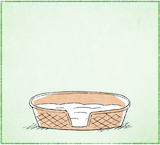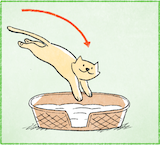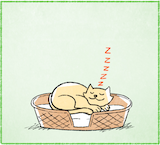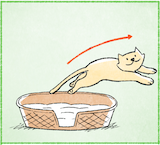



นี้คืออี่หยัง นี้คือบ่อนนอน เป็นบ่อนนอนน้อยๆ เป็นบ่อนนอนบ่ใหญ่หลาย เป็นบ่อนนอนวงกม
บ่อนนอนอันนี้เฮ็ดมาจากอี่หยัง บ่อนนอนนี้เฮ็ดมาจากผ้า เฮ็ดมาจากสิ่งของที่มันนุ้มๆ สามาดนอนได้ แล้วมีแฮงและซำบาย แล้วบ่เฮ็ดให้เฮาเจ็บนั้นหละ
บ่อนนอนอันนี้เฮ็ดจั่งใด บ่อนนอนนี้เฮ็ดบ่ญาก สามาดเอาผ้าได้หลายผืน มาวางฮองกัน หลือวางซ้อนกันหลายๆ ผืน เฮ็ดให้มันนุ้ม หลือสามาดนอนได้นั้นหละ
บ่อนนอนอันนี้เอาไว้เฮ็ดหญัง เอาไว้ถ้านอน เอาไว้ถ้าให้สัดนอน หลือสัดน้อยๆ อย่างเซ้น หมา หลือแมวนั้นหละ หลือเป็นคนกะได้ หลือเป็นเด็กน้อยกะได้ ที่สามาดนอนบ่อนนอนนี้ได้
2
แมวมันกำลังเฮ็ดหญัง แมวมันกำลังโดดไปบ่อนนอน มันกำลังสิโดดไปนอนคือใดบุ จักมันสิโดดไปเฮ็ดหญัง เห็นแต่ว่ามันโดดไปอยู่บ่อนนอน
แมวมันโดดลงมาจั่งใด มันใซ้ขาหน้าของมันกะโดดลงมาบ่อนนอนก่อน
โดดซงสีไกๆ คือสิโดดมาแต่ไกเติบ เพาะว่าโตมันเป็นซงญาวๆ ซงสิฟ้าวโดดเข้ามาบ่อนนอน
3
แมวมันกำลังเฮ็ดหญัง แมวมันกำลังนอนหลับ มันกำลังนอนหลับอยู่ มันนอนหลับอยู่เทิงที่นอน นอนหลับอยู่เทิงบ่อนนอนนั้นหละ
เป็นหญังแมวมันคือหลับ แมวมันหิวนอนแม่นบ่ แม่น มันอาดสิหิวนอน มันอาดสิหิวนอนหลายกะได้ มันกะเลยนอนหลับ
มันนอนหลับอยู่เทิงบ่อนนอน นอนหลับอยู่โตเดียว โตเดียวข้อหล้อของมันนั้นหละ
แมวมันนอนหลับเป็นตามีแฮงบ่ เป็นตามีแฮงอยู่ เป็นตาซำบายคัก มันนอนหลับอยู่โตเดียว เป็นตามีแฮง เป็นตาซำบายคักกะด้อกะเดี้ย คือสิมีความสุขหลาย ที่มันได้นอนนั้นหนะ
4
แมวมันกำลังเฮ็ดหญัง แมวมันกำลังโดดออกจากที่นอน โดดออกจากบ่อนนอนนั้นหละ มันคือสิตื่นแล้ว มันคือสิเซานอนแล้ว มันกะเลยโดดออกจากบ่อนนอน
แมวมันตื่นแล้วมันสิไปใสต่อ อันนี้กะบ่ลู้คือกัน จักว่าแมวโตนี้มันสิกะโดดไปใส จักว่าแมวโตนี้มันสิไปใสต่อ อันนี้กะบ่ฮู้คือกัน จักว่ามันสิไปใส
Link to overview page
Link to dictionary
| Isaan | Pronunciation | Tones | Thai | English/Notes |
|---|---|---|---|---|
| นี้ | ni: | HF | นี้ | 1. this 2. here |
| คือ | khʉ: | HR | คือ | 1. to be, to resemble, like, as 2. why {บักหล้าคือบ่เก็บโต่ะแน่ = [addressing a young boy] Why haven't you cleared the table?} |
| อี่หยัง | i:-yaŋ | H-M | อะไร | 1. what {นี้คืออี่หยัง = What is this?} {มื้อนี้เจ้าเฮ็ดอี่หยัง = What are you doing today?} {กินเข้างายกับอี่หยัง = What did you have for breakfast?} 2. something, anything, (in negations) nothing {บ่ต้องเฮ็ดอี่หยังอีกเลยนอกจากใส่ปุย = [we] don't need to do anything besides adding fertilizer} |
| บ่อน | bɔn | H | ที่, ที่นอน | 1. place 2. clf. for places 3. place for sleeping |
| นอน | nɔ:n | HR | นอน | 1. to lie down 2. to sleep |
| เป็น | pen | M | เป็น | 1. to be, to exist 2. to be able to 3. to suffer, sth. happens to 4. เป็นหญัง[...]คือ in initial position: why? {เป็นหญังเขากะคือแปงฟัน = Why is he brushing his teeth?} {เป็นหญังเคี่ยงบินมันคือสิตก = Why is the airplane falling down?} |
| น้อย | nɔ:i | HF | น้อย | 1. few, little 2. small |
| บ่ | bɔ: | H | ไม่ | 1. no, not 2. question particle, transforming a statement into a question Notes: spelling exception in line with common usage on social media |
| ใหญ่ | ɲai | H | ใหญ่ | large, big |
| หลาย | la:i | M | เยอะ, มาก | many, much, very |
| วงกม | woŋ-gom | HR-M | วงกลม | 1. circle, ring, sphere 2. round |
| อัน | an | M | อัน | 1. thing, object 2. general clf. for objects |
| เฮ็ด | het | H | ทำ | to do, to make |
| มา | ma: | HR | มา | 1. to come 2. auxiliary expressing action towards the present or focal time {กะคุเฮ็ดมาจากอี่หยัง = What is the bucket made of?} {แล้วเขากะเก็บเงินจากพุนั้นมา = and then she takes the money of that person} |
| จาก | ja:k | LF | จาก | 1. from {... เฮ็ดมาจากอี่หยัง = ... is made from what?} 2. to depart |
| ผ้า | pha: | LF | ผ้า | 1. clothes 2. cloth |
| สิ่งของ | siŋ-khɔ:ŋ | H-M | สิ่งของ | thing, object |
| ที่ | thi: | H | ที่ | 1. that, which {คนที่ยืนอยู่ฝั่งขวา = the person which is standing on the right = the person standing on the right} {เว้าคำที่บ่สุพาบ = to speak words which are impolite = to speak impolitely} 2. for ordinal numbers {ที่สาม = third} |
| มัน | man | HR | มัน | it (also used to refer to people) |
| นุ้ม | num | HF | นุ่ม | soft {หมอนมันนุ้ม = the pillow is soft} |
| สามาด | sa:-ma:t | M-HF | สามารถ | can, to be able |
| ได้ | dai | HF | ได้ | 1. can 2. to get, to obtain 3. before verb: indicating past tense 4. บ่ได้ + verb: not |
| แล้ว | lɛ:o | HF | แล้ว | 1. finished 2. already 3. and then, and next (especially แล้วกะ) 4. auxiliary for past tense |
| มีแฮง | mi:-hɛ:ŋ | HR-HR | มีความสุข, สบาย, รู้สึกดี | happy, comfortable, pleasant, to feel good or well |
| และ | lɛ | H | และ | and |
| ซำบาย | sam-ba:i | HR-M | สบาย | comfortable, feel good |
| ให้ | hai | LF | ให้ | 1. to give {หมอกำลังเอายาให้คนป่วยกิน = the doctor is giving the patient medicine} 2. for 3. to allow, to be allowed |
| เฮา | hao | HR | เรา | 1. personal pronoun: we 2. personal pronoun: I |
| เจ็บ | jep | M | เจ็บ | painful, to hurt |
| นั้นหละ | nan-la | HF-M | นั่นแหละ | auxiliary for emphasis at the end of a phrase |
| จั่งใด | jaŋ-dai | H-M | ยังไง, แบบไหน | how, in what manner {บักนาวมันมีลดซาดจั่งใด = Lime fruits have what kind of taste?} {เขาปิดแอจั่งใด = How is he switching off the A/C?} {เทียนใซ้จั่งใด = How's a candle used?} {สิใซ้จั่งใด = how is [it] used?} |
| ญาก | ɲa:k | HF | ยาก | difficult, hard |
| เอา | ao | M | เอา | to take, to give {เขากำลังเอาก่องไปซั่ง = he's taking the boxes to weigh them} {หมอกำลังเอายาให้คนป่วยกิน = the doctor is giving medicine to the patient} {เอาไว้ถ้า = is for, is used for, has the purpose of} |
| ผืน | phʉ:n | M | ผืน | clf. for pieces of cloth |
| วาง | wa:ŋ | HR | วาง | to place, to set/put down {โทละสับ/phone: วางสาย = to hang up} {มีเกิบวางอยู่ในก่อง = there are shoes in the box} {มือข้างหนึ่งเขาวางอยู่เทิงโต่ะ = he's put one of his hands on the table} |
| ฮอง | hɔ:ŋ | HR | รอง | 1. to support, to bear {ถ้วยฮอง, จานฮอง = saucer} 2. to bolster 3. collect rain water {โอ่งเอาไว้ฮองน้ำ = a water jar is used to collect water (from the rain)} |
| กัน | gan | M | กัน | mutual, each other, with another, together {เขากำลังนั่งเว้ากัน = they're sitting and talking} {เขาสองคนฮักกัน = they love each other} {ปาสองโตนี้ ใหญ่ห่างกันหลายบ่ = These two fish here, are they very different in size (from each other)?} {ต่างกัน = to be different (from each other)} {ก่องอันไหนหนักกว่ากัน = Which box is heavier (than the other(s))?} |
| หลือ | lʉ: | M | หรือ | or |
| ซ้อน | sɔ:n | HF | ซ้อน | to pile up, to put on, to lay on top of, to stack {เอาถ้วยวางซ้อนกัน = to pile up/stack bowls} {พุซ้อน = passenger, e.g., of a motorbike or tuk tuk} |
| ไว้ | wai | HF | ไว้ | 1. to keep, to put, to place, to retain, to save, to reserve {เขาเอาหัวของเขาไว้ใส = Where does she put her head?} {หมาสิเลี้ยงไว้บ้าน = dogs are kept/raised in the house} {ไก่เลี้ยงไว้ในคอก = chicken are kept/raised in a coop} {หน้ามันบังไว้ = the face is covered/not visible} {เขาเอาโทละสับวางไว้หู = he holds the phone to his ear} 2. for {นาลิกาปุกมีไว้เฮ็ดหญัง = What is an alarm clock for?} {หม้อเอาไว้เฮ็ดแนวกิน = a pot is used to make food} {ก่องเอาไว้เฮ็ดหญัง ก่องเอาไว้ใส่ของ = What is the box for? It's for putting in stuff.} Notes: see also ไว้ถ้า |
| หญัง | ɲaŋ | M | อะไร, เป็นหญัง = ทำไม | 1. what {เขากำลังเฮ็ดหญัง = What is he doing?} {ธูปเอาไว้เฮ็ดหญัง = What are incense sticks for?} 2. something, anything, (nothing) 3. เป็นหญัง[...]คือ in initial position: why {เป็นหญังเขาคือใส่บักพิกลงไปในกวยเตียว = Why is he putting chili in [his] noodle soup?} {เป็นหญังหน้าต่างมันคือเปิด = Why is the window open?} {เป็นหญังมันคือมีควนไฟ = Why is there smoke?} |
| ไว้ถ้า | wai-tha: | HF-LF | usually in a positive statement or answer: is for, is used for, has the purpose of {กะทะมีไว้ถ้าทอด = a pan is for frying} {น้ำบักนาวมีไว้ถ้าปุงอาหาน = lime juice is used to season food} {ปากกามีไว้ถ้าเขียน = a pen is for writing} {กะเทียมเอาไว้ถ้าเฮ็ดแนวกิน = garlic is used to make food} {ขาเอาไว้ถ้าญ่าง = legs are for walking} {เกิบเอาไว้ถ้าใส่ = shoes are for wearing} Notes: see also ไว้ |
|
| สัด | sat | M | สัตว์ | animal |
| อย่างเซ้น | ya:ŋ-sen | H-HF | อย่างเช่น | for example, such as, like Notes: pronunciation: also realized as อย่างเช้น |
| หมา | ma: | M | หมา | dog |
| แมว | mɛ:o | HR | แมว | cat |
| คน | khon | HR | คน | person, people |
| กะ | ga | M | ก็ | 1. then, consequently 2. also |
| เด็กน้อย | dek-nɔ:i | M-HF | เด็ก, เด็กน้อย | child |
| กำลัง | gam-laŋ | M-HR | กำลัง | auxiliary indicating continuous or progressive action |
| โดด | do:t | LF | กระโดด | to jump Notes: see also กะโดด |
| ไป | pai | M | ไป | 1. to go 2. auxiliary indicating action extending into the future |
| สิ | si | M | จะ | future tense auxiliary {เขากำลังสิตื่น = he's about to wake up} {สิไปตะหลาด = [I'm] going to the market} |
| คือใดบุ | khʉ:-dai-bu | HR-M-M | 1. who knows? 2. maybe |
|
| จัก | jak | M | จัก | 1. answer to a question: [I] don't know, don't know exactly, [I'm] not sure {พุซายคนนี้เขาเถ้าไป่ จัก จักเถ้าหลือบ่เถ้า เบิ่งบ่ค่อยออก = Is this man here already old? I don't know. I can't see clearly whether he's old or not.} {เขาเว้ากันอยู่ใส จักคือกัน = Where are they talking? I don't know either.} 2. exact(ly), what exactly {จักต้มอี่หยังกะบ่ฮู้ = I don't know what (exactly) he is cooking} {บ่ลู้คือกันจักปาอี่หยัง = I don't know either what kind of fish this is} 3. how much/many? {ต้นไม้มีจักต้น = How many trees are there?} {ตอนนี้จักโมงแล้ว = What time is it now?} {มือของเฮานี้สิมีจักนิ้ว = How many fingers do our hands have?} 4. a bit, a little bit {จักหน่อย/จักหน่อยหนึ่ง = a bit, a little bit} |
| เห็น | hen | M | เห็น | to see |
| แต่ว่า | tɛ:-wa: | H-H | แต่ว่า | 1. but 2. only {ฮู้แต่ว่าเขายืนอยู่พุเดียว = I only know that he's standing there by himself} |
| อยู่ | yu: | H | อยู่ | 1. to be (located) at 2. yet, still 3. auxiliary indicating continuous or progressive action {ทอดปาอยู่ในกะทะ = (in the process of) frying a fish in the pan} {แม่กำลังเมี้ยนเฮียนอยู่ = mother is cleaning/tidying up the house} |
| ลง | loŋ | HR | ลง | 1. to descend, to lower, to go down 2. down 3. bus/train etc.: to get off, to disembark {คนกำลังลงลดบั่ด = people are getting off the bus} 4. boat/ship etc.: to get on, to board {เขากำลังญ่างลงเลีย = he's boarding/getting on the boat} |
| ใซ้ | sai | HF | ใช้ | to use |
| ขา | kha: | M | ขา | leg {ขาหน้า = front leg} {ขาหลัง = hind leg} {ส้งขาญาว = long trousers} |
| หน้า | na: | LF | หน้า | 1. front {ปะตูหน้า = front door} 2. face {เขากำลังล้างหน้า = he's washing his face} 3. auxiliary: conditional tense {เขาหน้าสิเป็นพุบ่าวพุสาวกัน = they are probably groom and bride} {กะหน้าสิส้มอยู่ = it's likely to be sour} 4. season {หน้าฮ้อน = hot season} 5. page 6. clf. for pages {เฮาอ่านฮอดหน้านั้นแล้ว = we've read until this page} |
| ของ | khɔ:ŋ | M | ของ | of, belonging to |
| กะโดด | ga-do:t | M-LF | กระโดด | to jump Notes: see also โดด |
| ก่อน | gɔ:n | H | ก่อน | 1. before 2. first, first of all |
| ซงสี | soŋ-si: | HR-M | ท่าทาง, คล้ายๆ เหมือนๆ | as if, like Notes: translation to be confirmed |
| ไก | gai | M | ไกล | far, distant |
| แต่ | tɛ: | H | จาก | 1. from {มาแต่โลงเลียน = [I'm] coming from the school} {เห็นเขาญ่างมาแต่ทางหลัง = seeing him coming from behind, see also: แต่ใส} 2. since, ago {แต่โดนเติบ = long ago} |
| เติบ | tə:p | LF | intensifier: very, much {เว้ากันโดนเติบ = to talk a long time} | |
| เพาะว่า | phɔ-wa: | H-H | เพราะว่า | because |
| โต | to: | M | ตัว | 1. body, self 2. clf. for animals, characters/letters/consonants, appliances, clothes (e.g., pairs of trousers, shirts) |
| ซง | soŋ | HR | ทรง | 1. shape, form 2. as if, like Notes: translation to be confirmed |
| ญาว | ɲa:o | HR | ยาว | long |
| ฟ้าว | fa:o | HF | รีบ | to hurry, to rush |
| เข้า | khao | LF | เข้า | to enter, to go inside, to come/go in/on {เข้าห้องน้ำ = to go to the bathroom} {เข้านอน = to go to bed} {ขี่เลียเข้าไปเกาะ = to take a boat to go on an island} |
| นอนหลับ | nɔ:n-lap | HR-M | นอนหลับ | to sleep |
| เทิง | thə:ŋ | HR | บน | 1. on, on top of, at, in {เทิงโต่ะ = at/on the table} {กบมันนั่งอยู่เทิงใบบัว = the frog is sitting on the lotus leaf} {เทิงท้องฟ้า = in the sky} {มันแล่นอยู่เทิงลาง = [the train] runs on rails} {มีคนนั่งอยู่เทิงลดสามล้อสามคน = there are three people sitting in the tuk tuk} 2. up, upward Notes: pronunciation: also realized as ทัง |
| ที่ | thi: | H | ที่ | 1. in/at {ที่นี้= here} 2. place {สิมีขายอยู่หลายที่หลายหม้อง = it is being sold in many places} {ที่นอน = sleeping place} 3. clf. for places |
| หลับ | lap | M | หลับ | 1. to sleep {นอนหลับ = to sleep (see separate entry)} 2. to close (the eyes) {หลับตา = to close one's eyes} |
| หิว | hiu | M | หิว | hungry, to crave (food, water, sleep etc.) {หิวนอน = to be tired} {หิวน้ำ = to be thirsty} {หิวเข้า = to be hungry} |
| แม่นบ่ | mɛ:n-bɔ: | H-H | ใช่ไหม | question particle: ..., right? ..., isn't it? ..., don't you? etc. {เจ้าได้เห็นสิ่งนั้นแม่นบ่ = You've seen that, haven't you?} {ฝนกำลังตกแม่นบ่ = It's raining, isn't it?} {นี้คือกะคุแม่นบ่ = This is a bucket, isn't it?} |
| แม่น | mɛ:n | H | ใช่ | 1. yes 2. affirmative particle |
| อาด | a:t | LF | อาจ | 1. might, may, will 2. likely |
| เลย | lə:i | HR | เลย | 1. futher on, beyond, past {เข็มน้อยเลยเลขสิบสองไป = the minute hand has passed number twelve} 2. too much 3. at all 4. definitively 5. completely, utterly |
| เดียว | di:ao | M | เดียว | only, alone, single |
| ข้อหล้อ | khɔ:-lɔ: | LF-LF | เท่านั้น, ขนาดนั้น, น้อยๆ | only {ต้นไม้มีต้นเดียว ต้นเดียวข้อหล้อ = there's one tree, only one tree} {มีบ้านหลังเดียวข้อหล้อ = there's only one house} |
| ตามีแฮง | ta:-mi:-hɛ:ŋ | M-HR-HR | น่าสบาย | happily, comfortably, feeling well |
| ตา | ta: | M | ตา | as a prefix: likely, worthy, fit for (like Thai น่า-) {ตาฮัก = lovely/cute} {ตาสะออน = praiseworthy} {ตาหวาน = (of ice cream) [likely to be] sweet} {ตาอยู่ = to be a good place to be} Notes: see also various entries for ตา-, e.g., ตาแซบ, ตาพู่ฮ้าย, ตาย้าน, ตาอยากหัว, ตาฮัก, ตามีแฮง |
| คัก | khak | H | intensifier: very, very much | |
| กะด้อกะเดี้ย | ga-dɔ:k-ga-di:a | M-HF-M-HF | มากมาย, มากเกินไป | intensifier: very, very much |
| มี | mi: | HR | มี | 1. to have 2. there is |
| ความสุข | khwa:m-suk | HR-M | ความสุข | happiness |
| นั้นหนะ | nan-na | HF-M | final particle: for emphasis | |
| ออก | ɔ:k | LF | ออก | 1. to go out, to leave 2. out |
| ตื่น | tʉ:n | H | ตื่น | to wake up |
| เซา | sao | HR | จบ | 1. to stop, to be finished {น้ำมันเซาไหลแล้ว = the water has stopped flowing} {ฝนเซาตกแล้ว = it has stopped raining} {มันสิเซาเสียงดัง = (phone) it stops ringing loudly} 2. to prevent, to hinder 3. to rest {เซาเมี่ยย = to rest} |
| ใส | sai | M | (ที่)ไหน | 1. where? {สิไปใส = Where are [you] going?} {มาแต่ใส = Where are [you] coming from?} {กะทะอยู่ใส = Where's the pan?} 2. somewhere, anywhere {ใสกะได้ = anywhere, wherever you like} |
| ต่อ | tɔ: | H | ต่อ | 1. next 2. to join, to connect, to link Notes: see also ต่อไป, ต่อไปนี้ |
| ลู้ | lu: | HF | รู้ | 1. to know 2. to understand Notes: equivalent to ฮู้ |
| คือกัน | khʉ:-gan | HR-M | เหมือนกัน | 1. also, likewise, similarly {ยินดีที่ได้ฮู้จักคือกันคับ = Nice to meet you too!} 2. in negative sentences: either {บ่ลู้คือกัน = I don't know either} {จักคือกัน = I don't know (either)} |
| ว่า | wa: | H | ว่า | 1. that, as {คำว่า X = the word X} 2. to say |
| ฮู้ | hu: | HF | รู้ | 1. to know 2. to understand Notes: equivalent to ลู้ |